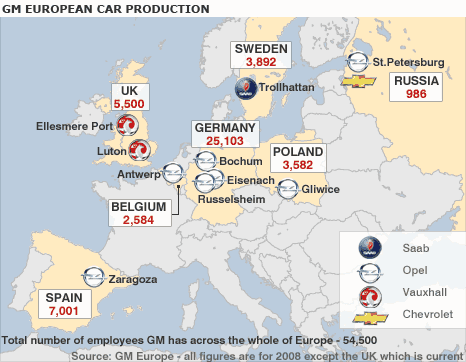US begins GM bankruptcy planning
 General Motors and the US Treasury have improved the offer to GM’s bondholders, as they prepare for the firm’s move into bankruptcy protection.
General Motors and the US Treasury have improved the offer to GM’s bondholders, as they prepare for the firm’s move into bankruptcy protection.Bondholders with $27bn (£17bn) of GM debt are now being offered the option to buy an extra 15% of GM shares as part of a proposed bankruptcy deal.
This is on top of the 10% they had previously been offered.
If bondholders back the new offer, it will allow GM to exit bankruptcy protection more quickly.
The US car giant is expected to apply for bankruptcy protection by 1 June.
GM said it had already secured the backing for the new offer from bondholders representing 20% of the bond debt.
Under its plans to reorganising its share base, the US government will take a 72.5% stake
German row
Meanwhile efforts are continuing to secure the sale of GM’s main European business Opel, and its UK brand Vauxhall.
German Foreign Minister Frank-Walter Steinmeier said he had received assurances from US Secretary of State Hillary Clinton that the US government would increase its support to help secure the sale of Opel, GM’s main European business, which has its headquarters in Germany.
Berlin had been due to announce its preferred bidder for Opel, and its UK Vauxhall brand, on Thursday, but it was forced to cancel its decision after GM revealed that Opel would need an extra 300m euros ($415m; £260m) in short-term funding.
German Economy Minister Karl-Theodor zu Guttenberg was critical of GM’s last-minute request, calling the move “pretty scandalous”.

He also criticised the level of involvement of the US Treasury Department, describing it as “marginal, to put it politely”.
Berlin also announced that US investor Ripplewood Holdings had pulled out of the race for Opel, leaving Italy’s Fiat and Canada’s Magna - whose bid is backed by Russian lender Sberbank - in the front seat.
There had also been a last-minute expression of interest from Beijing Automotive Industry Corp (BAIC), but German officials said that their focus was on Fiat and Magna.
The sale of Opel is a key part of GM’s plans to restructure its business.
The German government expects to receive the extra information it needs by Friday, when talks will reconvene in Berlin.
Car industry analyst Christoph Stuermer from Global Insight said he was confident the German government would be able to announce its preferred bidder on Friday.
Job cut fears

While GM will ultimately choose who buys Opel and Vauxhall, the preference of the German government is key because Berlin has pledged the most financial support for the eventual buyer.
The German government is offering the most money because half of Opel’s 50,000 workers are based in Germany.
And with Germany facing a general election in September, Berlin wishes to protect as many German job losses as possible when whoever buys Opel is expected to cut jobs to help secure the business’ long-term future.
The central involvement of the German government in the Opel talks has led to British unions expressing concern that any job cuts at the company could be focused upon its Vauxhall operations in the UK that employ 5,500 people.
But UK Business Secretary Lord Mandelson said he had received “categorical assurances” about continued Vauxhall production.
“We are making sure the future of Vauxhall is secured,” he said.
However, Lord Mandelson did admit job cuts were likely across all of the Opel business, including the Vauxhall arm.
The Belgian government has also expressed concern for the Opel workers in its country.
You can return to the main Market News page, or press the Back button on your browser.

